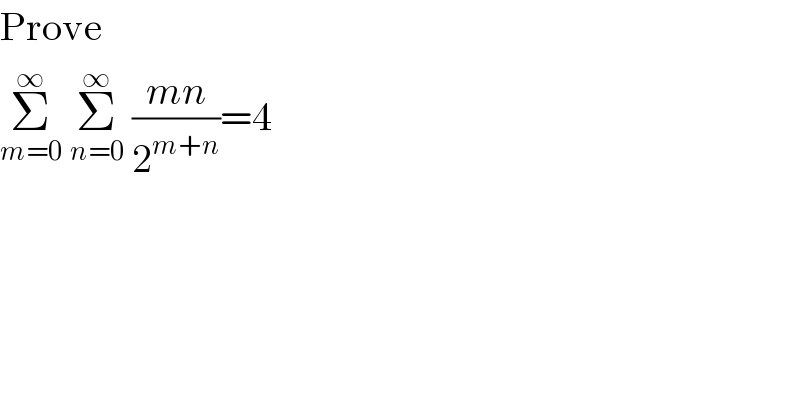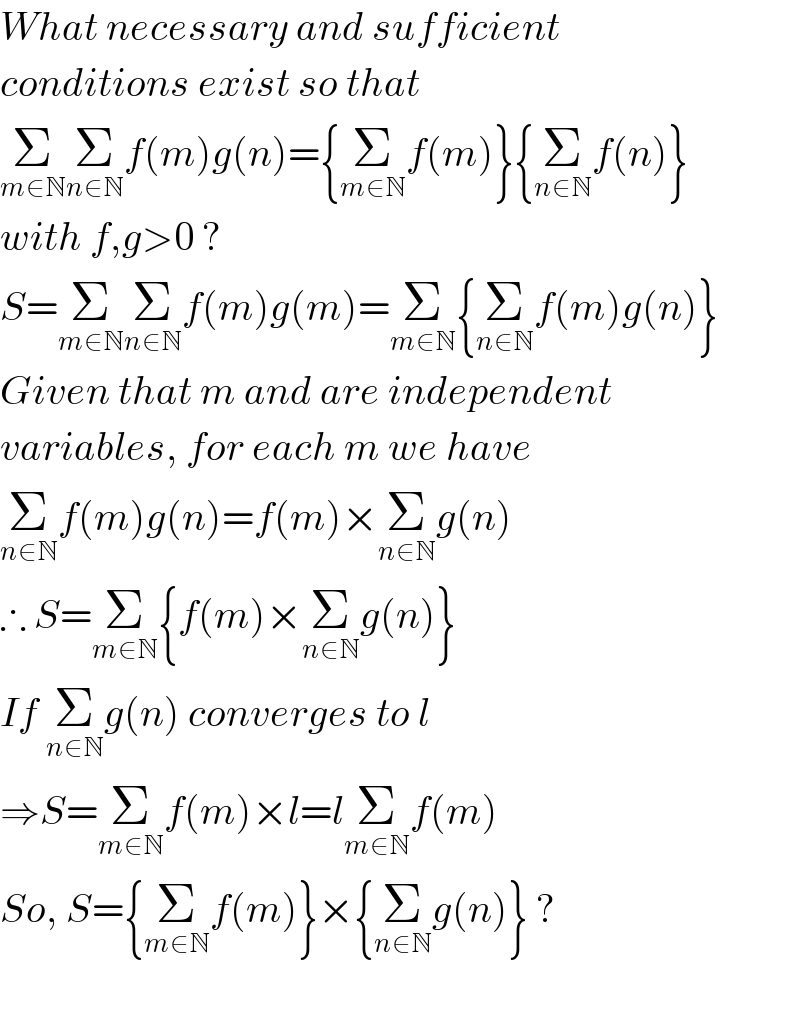
Question Number 3735 by prakash jain last updated on 19/Dec/15

$$\mathrm{Prove} \\ $$$$\underset{{m}=\mathrm{0}} {\overset{\infty} {\sum}}\:\underset{{n}=\mathrm{0}} {\overset{\infty} {\sum}}\:\frac{{mn}}{\mathrm{2}^{{m}+{n}} }=\mathrm{4} \\ $$
Commented by prakash jain last updated on 19/Dec/15

$$\mathrm{As}\:\mathrm{a}\:\mathrm{part}\:\mathrm{answer}\:\mathrm{to}\:\mathrm{Q3716}. \\ $$
Answered by prakash jain last updated on 19/Dec/15

$$\underset{{m}=\mathrm{0}} {\overset{\infty} {\sum}}\:\frac{{m}}{\mathrm{2}^{{m}} \:}\:\underset{{n}=\mathrm{0}} {\overset{\infty} {\sum}}\frac{{n}}{\mathrm{2}^{{n}} }=\underset{{m}=\mathrm{0}} {\overset{\infty} {\sum}}\frac{\mathrm{2}{m}}{\mathrm{2}^{{m}} }=\mathrm{4} \\ $$$${Q}\mathrm{3734}. \\ $$
Commented by Yozzii last updated on 19/Dec/15

$${What}\:{necessary}\:{and}\:{sufficient}\: \\ $$$${conditions}\:{exist}\:{so}\:{that} \\ $$$$\underset{{m}\in\mathbb{N}} {\sum}\underset{{n}\in\mathbb{N}} {\sum}{f}\left({m}\right){g}\left({n}\right)=\left\{\underset{{m}\in\mathbb{N}} {\sum}{f}\left({m}\right)\right\}\left\{\underset{{n}\in\mathbb{N}} {\sum}{f}\left({n}\right)\right\}\: \\ $$$${with}\:{f},{g}>\mathrm{0}\:? \\ $$$${S}=\underset{{m}\in\mathbb{N}} {\sum}\underset{{n}\in\mathbb{N}} {\sum}{f}\left({m}\right){g}\left({m}\right)=\underset{{m}\in\mathbb{N}} {\sum}\left\{\underset{{n}\in\mathbb{N}} {\sum}{f}\left({m}\right){g}\left({n}\right)\right\} \\ $$$${Given}\:{that}\:{m}\:{and}\:{are}\:{independent} \\ $$$${variables},\:{for}\:{each}\:{m}\:{we}\:{have}\: \\ $$$$\underset{{n}\in\mathbb{N}} {\sum}{f}\left({m}\right){g}\left({n}\right)={f}\left({m}\right)×\underset{{n}\in\mathbb{N}} {\sum}{g}\left({n}\right) \\ $$$$\therefore\:{S}=\underset{{m}\in\mathbb{N}} {\sum}\left\{{f}\left({m}\right)×\underset{{n}\in\mathbb{N}} {\sum}{g}\left({n}\right)\right\} \\ $$$${If}\:\underset{{n}\in\mathbb{N}} {\sum}{g}\left({n}\right)\:{converges}\:{to}\:{l} \\ $$$$\Rightarrow{S}=\underset{{m}\in\mathbb{N}} {\sum}{f}\left({m}\right)×{l}={l}\underset{{m}\in\mathbb{N}} {\sum}{f}\left({m}\right) \\ $$$${So},\:{S}=\left\{\underset{{m}\in\mathbb{N}} {\sum}{f}\left({m}\right)\right\}×\left\{\underset{{n}\in\mathbb{N}} {\sum}{g}\left({n}\right)\right\}\:? \\ $$$$ \\ $$
Commented by prakash jain last updated on 19/Dec/15

$${f}\left({m}\right)\:{is}\:{constant}\:{for}\:{summation}\:{over}\:{n}. \\ $$$${taking}\:{a}\:{constant}\:{out}\:{for}\:{summation}\:{is} \\ $$$${always}\:{valid}\:\left({even}\:{if}\:{the}\:{series}\:{is}\:{divergent}\right). \\ $$$${absolute}\:{convergence}\:{is}\:{required}\:{for}\:{rearrangmnt} \\ $$$${changing}\:{order}\:{of}\:{summation}. \\ $$
Commented by Yozzii last updated on 19/Dec/15

$${Thank}\:{you}. \\ $$
